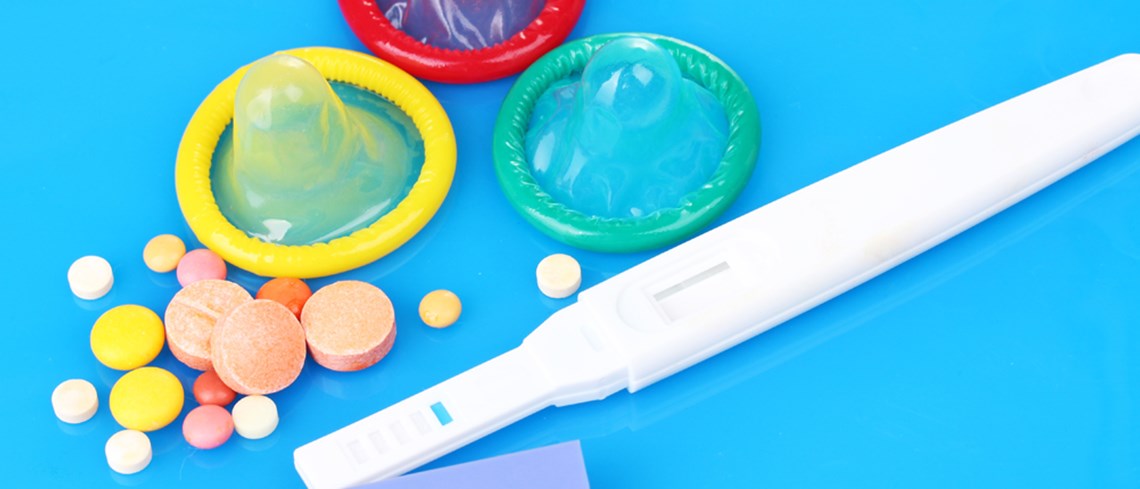Safe Sex is Good Sex
Learn about different types of contraception to help have happy and safe sex...

Male Condom
Top 4 Plus Points
- You only need to use them during sex
- They protect against a range of STIs, including HIV and AIDS
- They are easily available
- They are available in many shapes and sizes for many needs
Any bad points?
- You can interrupt sex when you stop to put them on
- Some couples don’t like the lack of feeling with condoms
Where can I get them from?
Condoms are available at your doctor’s clinic, family planning clinics, local hospital, pharmacies, supermarkets and online stores.
Female Condom
The Plus Points
- You only need to use them during sex
- They protect against a range of STIs, including HIV/AIDS
- They can be worn any time before sex
Any bad points?
- You can interrupt sex if you stop to wear them
- Some people complain of reduced sensitivity during sex
- They are not as widely available as male condoms
Where can I get them from?
You can get them at the doctor’s clinic, the pharmacy, supermarkets or online stores.
The Pill
Top 5 Plus Points
- It can make a woman’s periods lighter, reduce the duration and make them less painful
- It may ease symptoms of pre-menstrual syndrome/period tension/acne
- It does not affect sexual performance but you still need a condom to protect against STDs
- It lowers the risk of developing fibroids (non-cancerous tumours in the womb), ovarian cysts and breast cancers
Any bad points?
- The pill may make some women nauseous, suffer breast tenderness, spotting or bleeding between periods, weight gain, headaches and mood swings. Changing the pill dosage may help
- It may elevate blood pressure
- It does not protect against any STIs
- They must be taken every single day as prescribed
- They may become less effective when the woman is ill or taking antibiotics
- The woman may need other forms of contraception during breastfeeding
Some women suffer from some uncommon but serious side effects, which the doctor must discuss at the time of prescribing the pill.
Where can I get them from?
The pill is available from the doctor, family planning clinics and pharmacies, with a prescription.
Chlamydia
What is it?
Chlamydia is a condition that affects both men and women.
It is more serious when the infection spreads to a woman. If left untreated, it can spread to the womb and cause Pelvic Inflammatory Disease (PID), which poses many problems in having children.
How is it spread?
It is spread by having unprotected sex with an infected person. The condition is not immediately obvious – up to 70 - 80% people don’t exhibit any symptoms.
What are the symptoms?
- Frequent urination, and burning sensation or pain while urinating.
- A thin, cloudy discharge from the penis, observed first thing in the morning. This secretion is different from semen. The testicles may be swollen or painful.
- An abnormal discharge from the vagina, anus or urethra.
- Many people do not show any symptoms but may still be infected.
- Infected women may bleed between periods or during or after sex, and also suffer from lower abdominal pain.
How can I get rid of it?
A course of antibiotics prescribed by your doctor can remedy the condition.
Use a condom to reduce your chances of getting it.
Contraceptive Implant
Top Plus Points
- It doesn’t interfere with sexual activity or performance
- It can be used by breastfeeding women
- Fertility levels are restored once the implant is removed
- The contraception lasts for three and five years
Any bad points?
- The period patterns may change, and bleeding may become irregular
- It can have such side effects as headaches, acne, tender breasts, weight gain, abdominal discomfort and bloating
- Very rarely, it can infect the arm where the implant is inserted.
- It requires a small procedure to both insert and remove it.
- It can occasionally be difficult to remove the implant
- It can cause depression and mood swings in some women
- It does not protect against STIs
Where can I get one?
The contraceptive implant is only available from your doctor or family planning clinics, and must be fitted by a doctor or a trained nurse.
Contraceptive Injection
Top Plus Points
- Doesn't interfere with sex
- Can be used if you are breastfeeding
- It reduces the risk of developing pelvic inflammatory disease and cancer of the womb.
- Offers contraceptive protection for 8-12 weeks
- May reduce heavy, painful periods and help with premenstrual symptoms for some women
Any bad points?
- Periods may change, bleeding can be irregular (this can continue for several months or as long as the injection lasts)
- Possible side effects include headaches, acne, tender breasts, weight gain, mood swings abdominal pain and bloating
- Any side effects will probably last as long as the injection lasts (8-12 weeks)
- Sometimes fertility can take more than a year to return to normal after stopping the injection
- Doesn't protect against STIs, including HIV/AIDS
Where can I get one?
The contraceptive injection is only available from GPs and family planning clinics.
Diaphragms, caps and sponges
Top Plus Points
- You only need to use them when you have sex
- They can be fitted just before sex
- Diaphragms and caps may offer some protection against STIs, but sponges do not
Any bad points?
- They may cause cystitis in some women
- It takes a little time to be able to fit them effectively
- Diaphragms and caps only provide limited protection against STIs
Where can I get them from?
These must be fitted by a doctor when using for the first time. Once fitted, you can buy them from pharmacies.
Morning after pill
Please note: the morning after pill is not intended to be used as a form of regular contraception. For emergency use only.
Side Effects:
- Can cause sickness. If you are sick within 2 hours of taking the pill, then this can reduce its effectiveness
- Doesn't protect against STIs, including HIV/AIDS
- Has to be taken within a limited time after unprotected sex
- Should not be used as a regular method of contraception
- It can disrupt your periods
Where can I get it from?
Available from GPs, family planning clinics and sexual health clinics. Can be purchased at pharmacies in some countries if you are 16 or over. Availability and the age of its availability varies from country to country.
The Intrauterine System (IUS) (Hormone releasing IUD)
Top 5 Plus Points
- It lasts for five years
- It does not interfere with sexual performance
- The periods may become lighter, of a shorter duration and even less painful
- Fertility is restored quite quickly once the device is removed
- It can be used by breast feeding women
Any bad points?
- Some women may suffer irregular, slight bleeding for the first six months
- There may be some short-term side effects like headaches, acne and breast tenderness
- They may cause ovarian cysts in some women; these are painful but not dangerous. They usually disappear on their own.
- It can become dislodged or be expelled by the womb
- It can puncture the uterine wall and require surgical removal
- It does not protect against STIs
- It may cause small infection after insertion
Where can I get one?
They are available at your doctor’s clinic, family planning clinics and sexual health clinics. It must be fitted by a doctor or a trained nurse.
Male and female sterilization
These are permanent methods of contraception, and are surgical procedures. These involve tying up or removing the tubes that supply sperm in a man, or those that supply eggs in a woman.
Male sterilisation is seen to be up to 100%** effective. Female sterilisation is also up to 100%*** effective.
Top Plus Points
- The method does not interfere with sex
- It is permanent
- Male sterilisation is quick and simple, with low chance of failure. The chance of failure in female sterilisation is higher
Any bad points?
- These procedures are permanent and cannot be reversed
- It takes up to two months for all sperm to disappear from the semen, so added contraception is needed during this time. A sperm test can confirm if there are any sperms left.
- The tubes may fuse again and fertility is restored, though this is rare
- The procedures do not protect against STIs
- Female sterilisation usually involves general anaesthesia, while male sterilisation is done by a local anaesthetic.
Where can I find out more?
It is a surgical procedure, so it must be performed only by a doctor. You can get more information from family planning clinics, sexual health clinics and your GP.
Please see the following link for more detailed information on all these forms of contraception:
(The above information is only a selection of the good and bad points for the different forms of contraception.)







